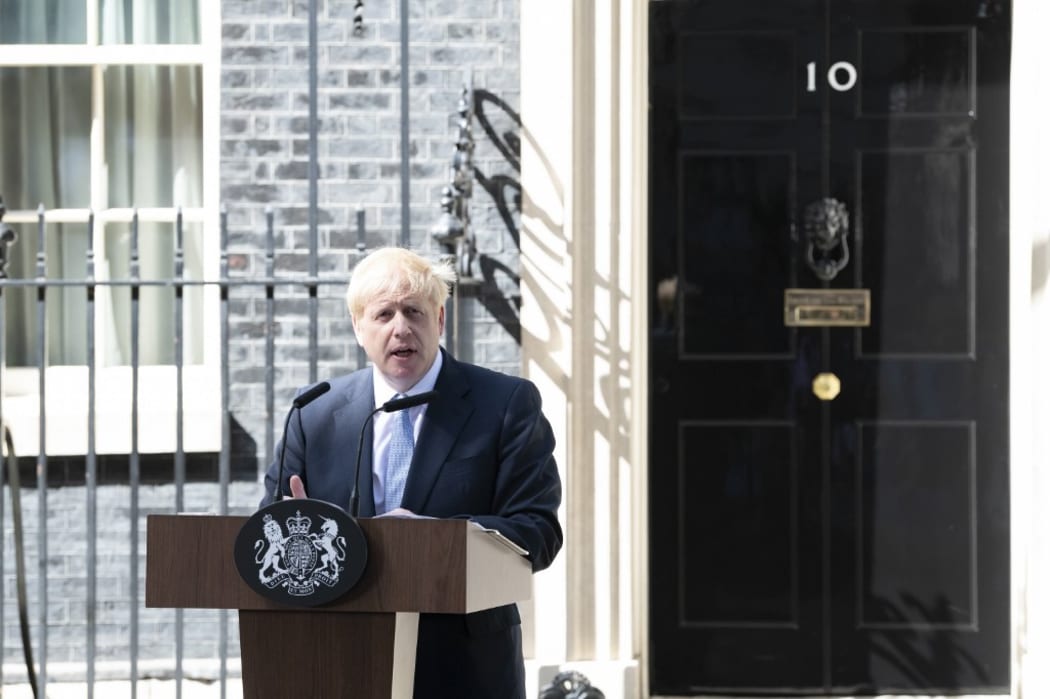Boris Johnson’s cabinet shuffle is “carnage”, says UK correspondent Matthew Parris.

Photo: AFP
"It’s a time like this which none of us, I think, has ever lived through", Parris told Kathryn Ryan.
Johnson began a full-scale reshaping of Theresa May's cabinet on his first day as British prime minister, sacking detractors, squeezing out leadership rival Jeremy Hunt and bringing in a team of prominent Brexiteers.
Along with resignations, it means more than half his predecessor's cabinet are no longer in their roles.
Johnson's new cabinet includes Sajid Javid as Chancellor of the Exchequer, Priti Patel as Home Secretary and Dominic Raab as Foreign Secretary and First Secretary of State, in effect making him Johnson's deputy prime minister.
Arch Brexiteer Jacob Rees-Mogg, who has proved such a thorn in May's side, was made leader of the House of Commons.
“The re-shuffle is very significant indeed, it’s carnage this new cabinet, he has chucked out almost everybody who disagreed with him or who has ever given him any trouble.
"He’s given posts to people who are plainly there because they are pro hard-Brexit without sometimes any obvious recommendation for the job they’re doing.”
Former Development Secretary Patel was effectively sacked by Theresa May in 2017 over her having undisclosed meetings with Israeli officials while a Minister of the Crown.
“Priti Patel has been made Home Secretary, she’s not in that rank of politician that you would think would be Home Secretary, but she’s been a hard line Brexiteer.
“Dominic Raab has been made Foreign Secretary, Raab the man who put Raab into rabies basically, he’s a really rabid Brexiteer. He’s a clever man, but it’s not the sort of steady hand you would expect.”
This was a revenge re-shuffle, Parris says.
“He has kicked in the shins anyone who has ever kicked him in the shins and installed a whole lot of people who are going to be in favour of crashing out without a deal on the 31st of October if we have to do it.
“It is not a cabinet for a two or three-year government, it is a cabinet for the battle which he thinks he’s about to face.”
His first battle will come when Johnson’s breezy rhetoric on doing a new deal meets reality in Brussels, Parris says.
“His promise he’s made to everybody to renegotiate the terms of exit from the EU, that Theresa May tried to negotiate, nobody believes he’s going to succeed in that, the Europeans keep making it clear they’re not going to re-open those negotiations.”
That edges the UK closer to a no deal exit, something Parliament will not countenance, says Parris.
“Parliament meanwhile, increasingly terrified of a no deal, and there is a strong majority in parliament against it, wonders how they can stop it happening.
“He may even prorogue parliament, he can do that, ask the Queen to suspend parliament and do it, as it were, without parliament. So, we are in, I think, for a very turbulent time.”
Parris believes Johnson is pinning his hopes on tweaking May’s deal and re-presenting it to parliament as a new, fresh Boris deal.
“He would then come back with essentially the same deal, but he would be Boris Johnson the great Brexiteer, with a Brexiteer cabinet saying this is a much better deal than we got before. There is a weariness in Britain and in the House of Commons with the whole thing. And there is a chance he could get that through parliament.”
For that to happen Johnson would have to reach across to the Labour MPs who broadly supported May’s deal, Parris says. That would potentially side line the hard right ultra-Brexiteers in his own party – but there’s a problem with that strategy, says Parris.
“The people he has just appointed to cabinet would all be resigning like flies at this point, and I just don’t think he’s going to succeed.”
Johnson’s great fear is a vote of no confidence by Parliament, and Parris says very few Tories would have to abstain or vote against the government to bring it down.
“Not many of them need to, only about eight of them need to, and the government is finished and I think there are more than eight - I think there are probably more than a dozen who, if we were on the eve of what they saw as crashing out of the European Union with no deal, would either abstain or vote against the government in a vote of no confidence.”
Johnson’s challenge then is to not get to that point, Parris says his best chance is to capitalise on the honeymoon period and go to a general election.
“If I were him I would go for the honeymoon election now, I would do it tomorrow.”

